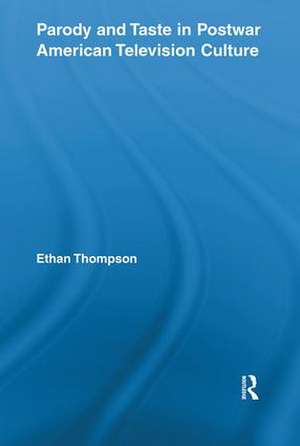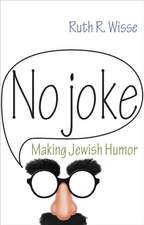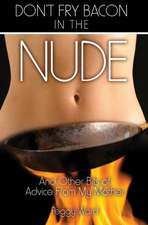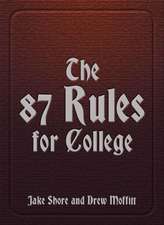Parody and Taste in Postwar American Television Culture: Routledge Advances in Television Studies
Autor Ethan Thompsonen Limba Engleză Paperback – 14 feb 2013
| Toate formatele și edițiile | Preț | Express |
|---|---|---|
| Paperback (1) | 350.96 lei 6-8 săpt. | |
| Taylor & Francis – 14 feb 2013 | 350.96 lei 6-8 săpt. | |
| Hardback (1) | 1053.33 lei 6-8 săpt. | |
| Taylor & Francis – 7 dec 2010 | 1053.33 lei 6-8 săpt. |
Din seria Routledge Advances in Television Studies
-
 Preț: 310.55 lei
Preț: 310.55 lei -
 Preț: 303.89 lei
Preț: 303.89 lei -
 Preț: 395.93 lei
Preț: 395.93 lei -
 Preț: 437.71 lei
Preț: 437.71 lei - 30%
 Preț: 849.37 lei
Preț: 849.37 lei -
 Preț: 380.95 lei
Preț: 380.95 lei -
 Preț: 377.09 lei
Preț: 377.09 lei -
 Preț: 383.33 lei
Preț: 383.33 lei - 19%
 Preț: 256.78 lei
Preț: 256.78 lei - 21%
 Preț: 250.93 lei
Preț: 250.93 lei -
 Preț: 374.21 lei
Preț: 374.21 lei -
 Preț: 372.30 lei
Preț: 372.30 lei - 16%
 Preț: 255.83 lei
Preț: 255.83 lei -
 Preț: 477.38 lei
Preț: 477.38 lei - 21%
 Preț: 250.96 lei
Preț: 250.96 lei -
 Preț: 365.37 lei
Preț: 365.37 lei -
 Preț: 368.43 lei
Preț: 368.43 lei -
 Preț: 392.93 lei
Preț: 392.93 lei -
 Preț: 311.28 lei
Preț: 311.28 lei - 18%
 Preț: 1002.80 lei
Preț: 1002.80 lei -
 Preț: 369.19 lei
Preț: 369.19 lei -
 Preț: 389.66 lei
Preț: 389.66 lei -
 Preț: 373.26 lei
Preț: 373.26 lei - 18%
 Preț: 1000.27 lei
Preț: 1000.27 lei - 18%
 Preț: 947.90 lei
Preț: 947.90 lei - 9%
 Preț: 934.84 lei
Preț: 934.84 lei
Preț: 350.96 lei
Nou
Puncte Express: 526
Preț estimativ în valută:
67.16€ • 71.81$ • 55.99£
67.16€ • 71.81$ • 55.99£
Carte tipărită la comandă
Livrare economică 18 aprilie-02 mai
Preluare comenzi: 021 569.72.76
Specificații
ISBN-13: 9780415839006
ISBN-10: 0415839009
Pagini: 180
Ilustrații: 20 black & white halftones
Dimensiuni: 152 x 229 x 13 mm
Greutate: 0.33 kg
Ediția:1
Editura: Taylor & Francis
Colecția Routledge
Seria Routledge Advances in Television Studies
Locul publicării:Oxford, United Kingdom
ISBN-10: 0415839009
Pagini: 180
Ilustrații: 20 black & white halftones
Dimensiuni: 152 x 229 x 13 mm
Greutate: 0.33 kg
Ediția:1
Editura: Taylor & Francis
Colecția Routledge
Seria Routledge Advances in Television Studies
Locul publicării:Oxford, United Kingdom
Public țintă
Postgraduate and UndergraduateCuprins
Introduction. The Parodic Impulse in the (Not-So) Fabulous Fifties 1. The New, Sick Sense: The Mediation of America’s Health and Humor at Mid-Century 2. What, Me Subversive? MAD Magazine and the Textual Strategies and Cultural Politics of Parody 3. The Parodic Sensibility and the Sophisticated Gaze: Masculinity and Taste in Playboy’s Penthouse 4. Ernie Kovacs and the Logics of Television Parody and Electronic Trickery 5. Black Tie, Straightjacket: Oscar Levant’s Sick Life on TV Conclusion: Television for People Who Hate Television?
Recenzii
"Parody and Taste in Postwar American Television Culture tackles important questions regarding how politics, power, culture, and the subversion of each works. A superb history, and a vital corrective to any who believe that subversion started with Comedy Central." - Jonathan Gray, Professor at University of Wisconsin Madison
"Parody and Taste in Postwar American Television Culture is not only a fascinating critical exploration of some comedic early TV programs starring Shelley Berman, Ernie Kovacs, and Oscar Levant. It is also an impressive engagement with a key moment in the history of taste in popular culture, considering ways in which the culture industry -- not only television broadcasters but also magazines like MAD and Playboy -- produced opportunities for critical engagement with mass media's forms and meanings. This book is an important contribution to early television history, and to studies of post-war American culture."- Michael Newman, Associate Professor at University of Wisconsin Milwaukee
"Parody and Taste in Postwar American Television Culture is not only a fascinating critical exploration of some comedic early TV programs starring Shelley Berman, Ernie Kovacs, and Oscar Levant. It is also an impressive engagement with a key moment in the history of taste in popular culture, considering ways in which the culture industry -- not only television broadcasters but also magazines like MAD and Playboy -- produced opportunities for critical engagement with mass media's forms and meanings. This book is an important contribution to early television history, and to studies of post-war American culture."- Michael Newman, Associate Professor at University of Wisconsin Milwaukee
Descriere
In this original study, Thompson explores the complicated relationships between Americans and television during the 1950s, as seen and effected through popular humor. Parody and Taste in Postwar American Television Culture documents how Americans grew accustomed to understanding politics, current events, and popular culture through comedy that is simultaneously critical, commercial, and funny. Along with the rapid growth of television in the 1950s, an explosion of satire and parody took place across a wide field of American culture—in magazines, comic books, film, comedy albums, and on television itself. Taken together, these case studies don’t just analyze and theorize the production and consumption of parody and television, but force us to revisit and revise our notions of postwar "consensus" culture as well.






